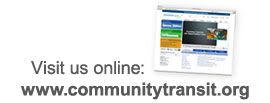Thursday, August 19, 2010
Transit Tax Measures
Funding for all public agencies, including transit, is in trouble due to the economy. In Washington state, most transit agencies rely on retail sales tax for the bulk of their funding.
Community Transit has been at the state-authorized maximum sales tax rate of 0.9 percent since voters approved an increase in 2001. In 2005, sales taxes generated $61.5 million in revenue for Community Transit. Our revenue peaked in 2007 and has since taken a nosedive.
In 2010, we estimate we'll get $63 million in sales tax revenue, a 1.6 percent increase over 2005. Yet since then we’ve increased service, built park & rides and had our existing buses and facilities get older and in need of maintenance or replacement.
With no authority to increase tax revenues, we raised fares and cut service in June to balance our budget for 2010. We are just beginning the budget process for 2011, and expect continued low levels of sales tax revenue.
Other agencies in the state are going to voters for more tax authorization, including:
Intercity Transit in Olympia was on the ballot Aug. 17 asking for a 0.2 percent increase in sales tax. The measure was passing handily in early returns. Without the increase in funding, the agency says it may cut service by 23 percent in the next two years, including all Sunday service.
Pierce Transit has a measure on the February 2011 ballot to increase its sales tax by 0.3 percent. The agency has already cut some service and is proposing a second fare increase to take place this fall. It says without the sales tax increase, service will need to be cut significantly.
C-Tran in Vancouver, Wash. expects to ask for a 0.3 percent sales tax increase in 2011 or face service cuts.
Whatcom Transportation Authority lost a ballot measure in April that would have raised its sales tax by 0.2 percent. The agency will be cutting Sunday and other service in September. A Bellingham transportation tax vote in the fall would have a portion of its proceeds dedicated to contracting with WTA for service restorations within the city.
Sales tax measures were approved in 2009 for Island Transit (0.3 percent) and Skagit Transit (0.2 percent). Sound Transit got voter support for a package of tax increases in 2008.
Community Transit has been at the state-authorized maximum sales tax rate of 0.9 percent since voters approved an increase in 2001. In 2005, sales taxes generated $61.5 million in revenue for Community Transit. Our revenue peaked in 2007 and has since taken a nosedive.
In 2010, we estimate we'll get $63 million in sales tax revenue, a 1.6 percent increase over 2005. Yet since then we’ve increased service, built park & rides and had our existing buses and facilities get older and in need of maintenance or replacement.
With no authority to increase tax revenues, we raised fares and cut service in June to balance our budget for 2010. We are just beginning the budget process for 2011, and expect continued low levels of sales tax revenue.
Other agencies in the state are going to voters for more tax authorization, including:
Intercity Transit in Olympia was on the ballot Aug. 17 asking for a 0.2 percent increase in sales tax. The measure was passing handily in early returns. Without the increase in funding, the agency says it may cut service by 23 percent in the next two years, including all Sunday service.
Pierce Transit has a measure on the February 2011 ballot to increase its sales tax by 0.3 percent. The agency has already cut some service and is proposing a second fare increase to take place this fall. It says without the sales tax increase, service will need to be cut significantly.
C-Tran in Vancouver, Wash. expects to ask for a 0.3 percent sales tax increase in 2011 or face service cuts.
Whatcom Transportation Authority lost a ballot measure in April that would have raised its sales tax by 0.2 percent. The agency will be cutting Sunday and other service in September. A Bellingham transportation tax vote in the fall would have a portion of its proceeds dedicated to contracting with WTA for service restorations within the city.
Sales tax measures were approved in 2009 for Island Transit (0.3 percent) and Skagit Transit (0.2 percent). Sound Transit got voter support for a package of tax increases in 2008.
Subscribe to:
Post Comments (Atom)






When will Sunday service be restored? Local transportation is crucial to people who do not have cars.
ReplyDeleteCT hasn't received any emergency funding so no Sunday service for the unforseen future. Doubtful they will get any in the near future with the economy the way it is and nobody wants to support a sales tax hike which is where CT gets most of its funding. So no money, no service.
ReplyDeleteMore cuts are supposed to be coming next year, so be prepared for even less service.
ReplyDeleteYep, I'll bet Saturdays will disappear, along with MORE jobs at CT. They are saying 'Agency wide cuts', but we'll see. I'm sure the drivers will take the brunt of they layoffs again. Maybe they should start the layoffs with the CEO since she is making more than the Gov. of WA!!
ReplyDeleteCommunity Transit don't know how control money!!!!
ReplyDeleteHey, is Ken Graska still kicking around?
ReplyDeleteEven though CT had to suffer the indignity of purchasing second-hand buses from Denver (and at that, a brand known for defects and structural failures), it still managed to put service on the road 7 days a week.
Ms. Eleanor is too ambitious, and not focused on managing CT.